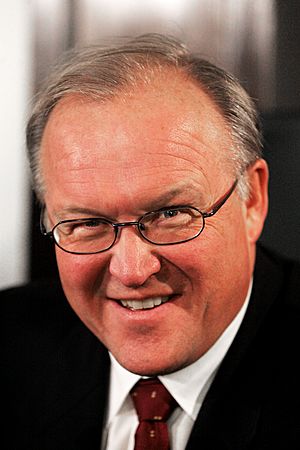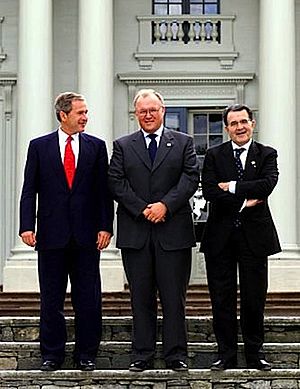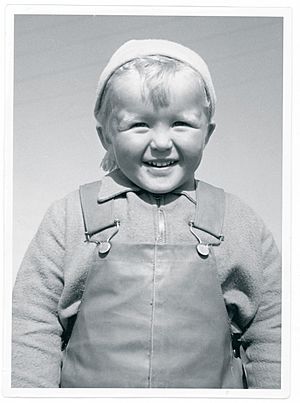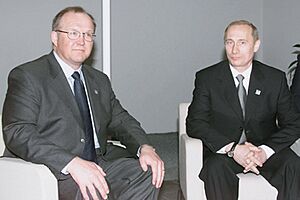Göran Persson facts for kids
Quick facts for kids
Göran Persson
|
|
|---|---|

Persson in 2005
|
|
| Prime Minister of Sweden | |
| In office 22 March 1996 – 6 October 2006 |
|
| Monarch | Carl XVI Gustaf |
| Deputy | Lena Hjelm-Wallén Margareta Winberg Marita Ulvskog Lars Engqvist Bo Ringholm |
| Preceded by | Ingvar Carlsson |
| Succeeded by | Fredrik Reinfeldt |
| Leader of the Opposition | |
| In office 6 October 2006 – 17 March 2007 |
|
| Monarch | Carl XVI Gustaf |
| Prime Minister | Fredrik Reinfeldt |
| Preceded by | Fredrik Reinfeldt |
| Succeeded by | Mona Sahlin |
| Leader of the Social Democrats | |
| In office 15 March 1996 – 17 March 2007 |
|
| Preceded by | Ingvar Carlsson |
| Succeeded by | Mona Sahlin |
| Minister for Finance | |
| In office 7 October 1994 – 22 March 1996 |
|
| Prime Minister | Ingvar Carlsson |
| Preceded by | Anne Wibble |
| Succeeded by | Erik Åsbrink |
| Minister for Schools | |
| In office 26 January 1989 – 4 October 1991 |
|
| Prime Minister | Ingvar Carlsson |
| Preceded by | Bengt Göransson |
| Succeeded by | Beatrice Ask |
| Member of the Riksdag for Södermanland County |
|
| In office 1 October 1979 – 11 June 1985 |
|
| In office 5 October 1991 – 30 April 2007 |
|
| Personal details | |
| Born | 20 January 1949 Vingåker, Sweden |
| Political party | Social Democratic |
| Spouses |
|
| Children | 2 |
| Residences | Övre Torp, Södermanland |
| Alma mater | Örebro University College |
| Cabinet | Persson's Cabinet |
| Signature | |
| Military service | |
| Allegiance | |
| Branch/service | |
| Years of service | 1973-1974 |
Hans Göran Persson (born January 20, 1949) is a Swedish politician. He served as the Prime Minister of Sweden from 1996 to 2006. He was also the leader of the Swedish Social Democratic Party from 1996 to 2007.
Persson was first elected to the Swedish Parliament (called the Riksdag) in 1979. He represented Södermanland County. He left Parliament in 1985 to work as a local leader in Katrineholm. He returned to Parliament in 1991. He was the Minister for Schools from 1989 to 1991. Later, he became the Minister for Finance from 1994 to 1996.
Who is Göran Persson?
Göran Persson is a well-known Swedish politician. He led Sweden as Prime Minister for over ten years. This makes him one of the longest-serving prime ministers in Swedish history. He is known for his strong speaking skills. He often gave speeches without needing notes.
His Early Life and Education
Göran Persson was born in Vingåker, Sweden. He grew up in a working-class family. When he was young, he thought about becoming a priest. He later studied social science at a college in Örebro. He left college before finishing his degree. In 2005, the college, now Örebro University, gave him an honorary doctorate.
Persson has been married three times. He has two daughters from his first marriage. In 2004, he and his third wife, Anitra Steen, bought a large farm. He speaks both Swedish and English. He is also a member of a Christian social democratic group.
Health Challenges During His Time in Office
In 2002, Persson broke his collarbone in a bicycle accident. This made it hard for him to lift his arm. He also felt faint during some public appearances. In 2003, he was diagnosed with hip problems. He chose to have surgery through Sweden's public healthcare system. He had a hip replacement operation in 2004. During this time, he walked with a limp and was in pain.
His Political Journey
Göran Persson started his political career in the early 1970s. He worked for the youth branch of the Social Democratic Party. He was also a local politician in Katrineholm.
Starting in National Politics
In 1979, he was elected to the Swedish Parliament. He later returned to local politics. In 1989, he became the Minister for Schools. He held this job until 1991. In 1994, the Social Democrats won the election. Persson then became the Minister for Finance. His main goal was to fix Sweden's economy. He worked to reduce the country's large budget deficit. He often said, "One who is in debt is not free."
Leading Sweden as Prime Minister
In 1996, Göran Persson became the Prime Minister of Sweden. He continued to focus on improving the economy. He made changes that helped Sweden's finances. This allowed Sweden to be considered for the European Economic and Monetary Union. However, these changes also led to higher unemployment for a while.
In the 1998 election, his party received fewer votes. But with support from the Green Party and the Left Party, he remained Prime Minister. In the 2002 election, his party gained more seats in Parliament. He continued to lead a minority government.
During his time as Prime Minister, Sweden faced several big events. These included protests in Gothenburg in 2001. There was also the murder of Foreign Minister Anna Lindh in 2003. The 2004 Indian Ocean earthquake (Boxing Day tsunami) also happened during his leadership. He was the first Western leader to visit North Korea in 2001.
Leaving Office and Beyond
After his party lost the general election on September 17, 2006, Persson resigned as Prime Minister. He also announced he would step down as party leader in March 2007. He left Parliament in April 2007.
Since leaving office, Persson has worked as a consultant. In 2007, he released his book, "Min väg, mina val" (My path, my choices). He has also served as chairman of the board for several organizations. These include Sveaskog, a government-owned forestry company, and Swedbank, a large Swedish bank. He also joined the European Council on Tolerance and Reconciliation. This group works to promote tolerance in Europe.
Foreign Policy and Global Efforts

Göran Persson supported Sweden having a bigger role in the European Union. When Sweden held the presidency of the EU in 2001, he helped with the expansion of the EU in 2004. He also wanted Sweden to join the European currency (the Euro). However, in a 2003 vote, most Swedes decided not to join.
Promoting Holocaust Education
In 1998, Prime Minister Persson started international discussions about Holocaust education. This led to the creation of the Task Force for International Cooperation on Holocaust Education, Remembrance, and Research (ITF). This organization now has many member countries. He also started a national campaign in Sweden called "Living History." Its goal was to use facts about the Holocaust to teach about democracy, tolerance, and the idea that all people are equal.
Awards and Recognition
Göran Persson has received several honors and awards for his work:
- Raoul Wallenberg Award (USA, 2001)
- Honorary doctorate from Dankook University (South Korea, 2004)
- Honorary doctorate from the University of Örebro (2004)
- The Sophie Prize, for his leadership in climate policy (Norway, 2007)
- H. M. The King's Medal, 12th size with chain (2009)
- Order of the Cross of Terra Mariana, First Class (Estonia, 2011)
See also
 In Spanish: Göran Persson para niños
In Spanish: Göran Persson para niños



